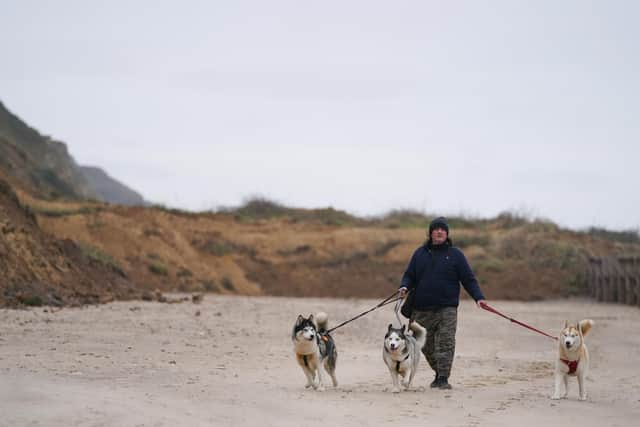Mystery dog illness in Leeds: How to treat symptoms of gastroenteritis - advice for owners
and live on Freeview channel 276
The British Veterinary Association issued a statement this week after reports of dogs falling ill arose after visiting local beaches across Yorkshire.
The virus, now believed to be gastroenteritis, has seen dogs across the North become sick with some form of infection that has caused inflammation of the stomach.
Advertisement
Hide AdAdvertisement
Hide AdThe spike in cases over recent weeks has been linked to recent trips to beaches, however as of yet there is no conclusive evidence that this is the case.
Head nurse, Emma Wiltshire, from White Cross Vets, in Roundhay, said: “We have definitely seen a huge increase in the number of dogs suffering from vomiting and diarrhoea in the last three weeks. Viruses that cause this kind of reaction can be picked up anywhere – not just on the beach. They can also be caused by dogs eating something they shouldn’t have like chocolate for example.
“It’s hard to say if there is something specific on the beach causing this, as dogs can pick up viruses wherever they walk – be that in the woods, on the cliffs, in the park or from drinking stagnant water.
“What is really important for dog owners to know is they shouldn’t ignore the symptoms for a day or two before getting treatment. We have been supporting our clients over the phone in the first instance, helping them manage the symptoms at home where possible, but the sooner a client contacts us the better. We can often treat with anti-sickness drugs and a special paste and food and send them home after their appointment. The longer they have been ill for, the more dehydrated they get, which means more lengthy and costly treatments, including over-night stays and rehydration drips.”
Advertisement
Hide AdAdvertisement
Hide Ad

Below is everything you need to know about the illness affecting dogs in Yorkshire - as well as advice from the British Veterinary Association.
What is gastroenteritis?
Gastroenteritis is the inflammation of the stomach and the intestines, caused by an infection with bacteria, viruses, parasites, medications, or even new foods.
In dogs, the condition causes abdominal pain, diarrhoea and vomiting mainly.
What are the signs of infection?
Most dogs with gastroenteritis will have frequent episodes of vomiting and diarrhoea
Advertisement
Hide AdAdvertisement
Hide AdThe vomit may contain foamy, yellowish bile, especially after the stomach has been emptied, and their diarrhoea will be the consistency of a soft-serve ice cream.
Many owners will observe dry heaving or gagging after their dog eats or drinks, as well as tenderness when touching their dog's stomach area.
What can cause gastroenteritis?
For the sudden increase in cases in Yorkshire, many are speculating that recent trips to the beaches have provoked the illness - however as of yet there is no conclusive evidence that this is the case.
Below are the known causes of the illness:
infections (e.g., bacterial, viral, fungal, or parasitic)
foreign bodies (especially string or thread) or other objects
Advertisement
Hide AdAdvertisement
Hide Adintussusception (the telescoping of the intestine into itself, causing an intestinal blockage)
tumours/cancer
poisoning/toxins (e.g., plants, cleaning agents)
endocrine disease (e.g., diabetes, hyperthyroidism)
pancreatic, liver, or kidney disease
How do I treat my dog?
The standard treatment of gastroenteritis is rehydration and restoration of blood electrolyte balance, normally using sodium, potassium or chloride.
Depending on the degree of dehydration, this fluid replacement will be given orally, beneath the skin, or by an IV treatment.
Medical treatment may also include antibiotics, antidiarrheal drugs, anti-vomiting drugs and gastrointestinal protectants.
Advertisement
Hide AdAdvertisement
Hide AdFood is usually avoided for the initial stages of treatment also.
What is the advice from the British Veterinary Association?
In a statement published on the British Veterinary Association's (BVA) website, BVA President Justine Shotton said:
“We are aware of a recent spike in cases of dogs falling ill from gastroenteritis-like symptoms in several parts of Yorkshire and North East England. Vets see gastroenteritis cases relatively commonly in practice, but numbers seem to be increasing and more widespread than usual.
“At this time, we can't speculate on what might be causing the symptoms, and there is currently no evidence to suggest a direct link between the illness and the dogs visiting the beaches. We’ve heard reports from vets in the area who are really far inland and they are also seeing an increase in these kinds of cases in dogs that have never been to the beach, so I’m not sure yet if we have enough information to make that link.
Advertisement
Hide AdAdvertisement
Hide Ad“With gastroenteritis, most cases are mild, but some dogs may need hospitalisation with a drip. In the worst situations, it can become haemorrhagic leading to secondary complications or even death, but that is very rare.”
Support the YEP and become a subscriber today. Enjoy unlimited access to local news and the latest on Leeds United, With a digital subscription, you see fewer ads, enjoy faster load times, and get access to exclusive newsletters and content. Click here to subscribe.
Comment Guidelines
National World encourages reader discussion on our stories. User feedback, insights and back-and-forth exchanges add a rich layer of context to reporting. Please review our Community Guidelines before commenting.
